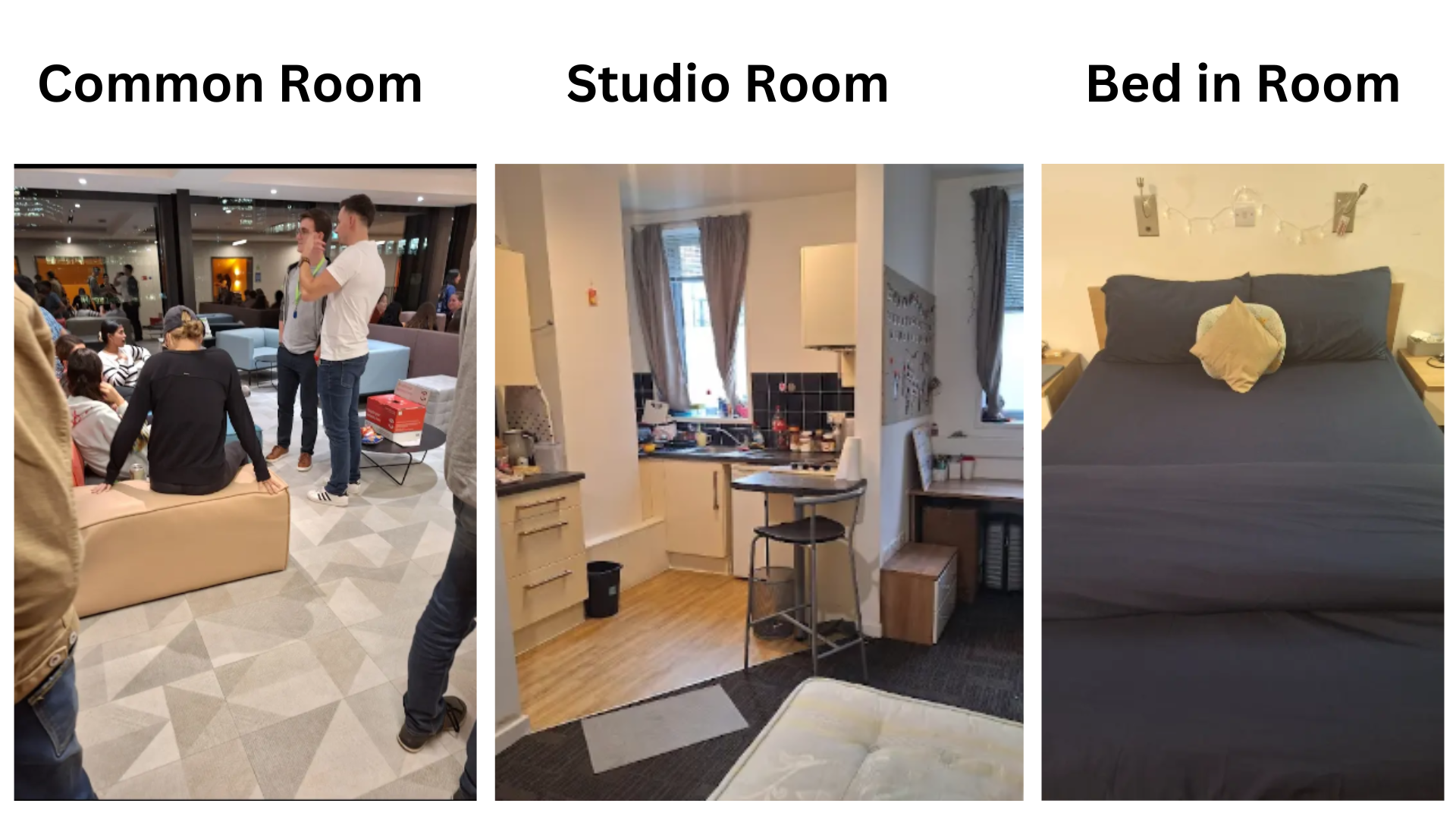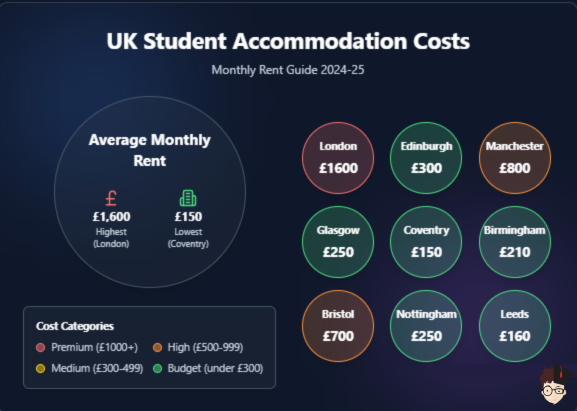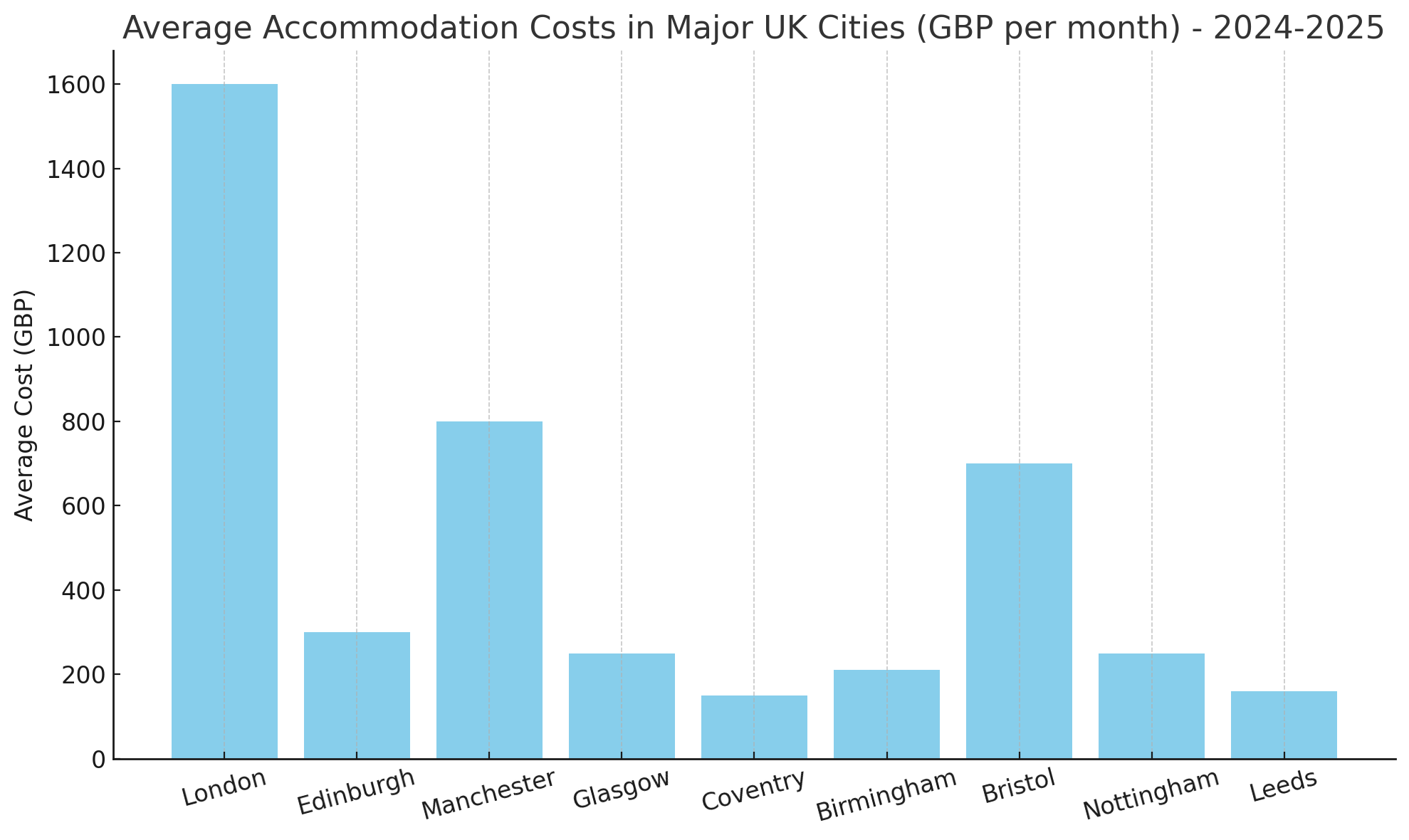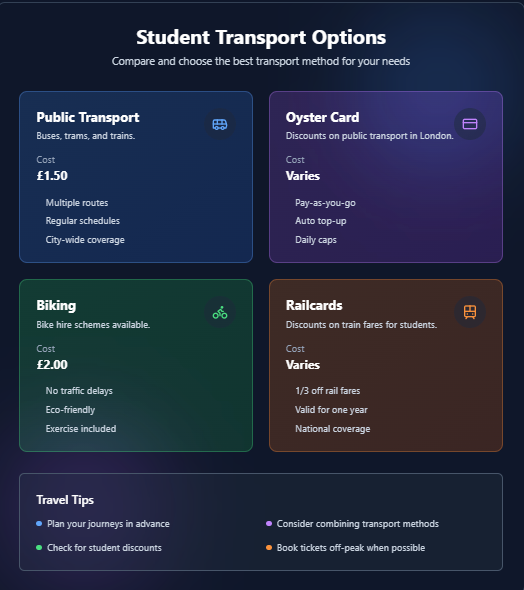Yatin Kumar Study Abroad Content Specialist
Study Abroad Content Specialist | Updated On - Nov 26, 2025
The United Kingdom is a top destination for international students, attracting thousands from India each year due to its prestigious universities and vibrant cultural landscape. However, one of the most critical aspects of studying in UK is finding suitable accommodation. Whether you're looking for on-campus housing or private rentals, understanding your options and costs is essential. The UK offers a diverse range of accommodation types, each with its own benefits and challenges. On average, student accommodation costs can range significantly, with on-campus living averaging between £680 to £2,100 (approximately ₹74,570 to ₹229,740) per year, while off-campus accommodations may cost between £120 to £700 (approximately ₹13,145 to ₹76,800) per week. Therefore, it’s crucial to know the insights that help in finding various accommodation options available to Indian students, also helps you make an informed decision about where to live during your studies.
Also Read: How to open a bank account in UK
Types of Student Accommodation in the UK
When it comes to student accommodation, UK universities offer a variety of options to cater to diverse preferences and budgets. Here are the most common types:
University Halls of Residence
- Description: On-campus accommodation is typically favored by first-year students, university halls provide a community living environment.
- Features: These halls often include single-occupancy or shared rooms with shared amenities like kitchens and bathrooms. Some may offer catered meal plans.
- Average Cost: Ranges from £680 to £2,100 (approximately ₹74,570 to ₹229,740) per year.
Also Check: Student Accommodation in London City
|
Aman Pawar from University of East London shares his experience: I have an on-campus accommodation. I was offered the accommodation when i had applied through the university portal online. Currently my monthly rent is £750, which i think is really good because it is a private room with a private bathroom and a shared kitchen, so you can actually have your privacy without anyone disturbing you. |
Private Student Halls
- Description: Privately managed halls that offer more autonomy and often better facilities than university halls.
- Features: Generally shared accommodations with kitchens, bathrooms, and sometimes en-suite options.
- Average Cost: Prices vary but typically align with university halls.
|
Jasmine from King's College London shares his experience: My accomodation was a private one, I found it online through different websites like university living, amber students, and my monthly rent was 1300 approx. All facilities in my accommodation were included: laundry, study room, common room, bike storage etc. |

Shared Apartments
- Description: Renting a room in an apartment shared with other students.
- Features: Offers more independence and a chance to live with friends while sharing costs.
- Average Cost: Ranges from £130 to £700 (approximately ₹14,200 to ₹76,800) per week depending on the city and amenities.
Studio Apartments
- Description: Self-contained units that combine living, cooking, and sleeping spaces.
- Features: Ideal for students who prefer privacy but may have a higher rental cost.
- Average Cost: Around £200 to £450 (approximately ₹21,880 to ₹49,300) per week.
Homestays
- Description: Living with a local family can provide cultural immersion and support.
- Features: Meals are often included, and it helps international students adapt to UK life.
- Average Cost: Generally ranges from £10 to £60 (approximately ₹1,100 to ₹6,580) per night.
Also Read: India to UK Travel Checklist
Private Rentals
- Description: Renting an entire flat or house can be a viable option for students, particularly for postgraduates or those with families.
- Features: Allows for more space and independence but comes with higher responsibilities.
- Average Cost: Monthly rents can range from £1,000 to £2,500 (approximately ₹109,400 to ₹274,800).

Also Check: Cheapest City in UK
Application Process for Accommodation
| Step | Description |
|---|---|
| Research Options | Start researching potential accommodation options as soon as you receive your university acceptance letter. |
| University Portal | Apply for on-campus accommodation through your university's online portal. |
| Use Dedicated Platforms | For off-campus options, use platforms like AmberStudent or Uniplaces to find suitable housing. |
| Prepare Documentation | Have necessary documents ready, such as identification and proof of university acceptance. |
| Early Application | Apply early for a better chance of securing desired accommodation. |
Also Check:
Cost of Living in Major UK Cities
The cost of living varies significantly across the UK, particularly between cities. Here’s a breakdown of average accommodation costs and living expenses in some popular student cities:
| City | Average Rent (GBP per month) | Average Cost of Living (GBP per month) |
|---|---|---|
| London | £1,256 - £3,193 | £843 |
| Manchester | £550 - £1,458 | £658 |
| Birmingham | £561 - £1,239 | £644 |
| Liverpool | £476 - £1,042 | £647 |
| Leeds | £520 - £1,240 | £598 |

These figures indicate that while London may offer a wealth of opportunities, it also comes with a higher price tag compared to other cities like Manchester or Leeds.
Additional Tips on Budgeting
| Tip | Description |
|---|---|
| Allocate Your Budget | Allocate around 30% of your total budget to accommodation and 20% for food/expenses. |
| Share Accommodations | Consider sharing accommodations with roommates to reduce rent and utility costs. |
| Public Transport | Use public transport instead of taxis to save on daily commuting costs. |
| Set Monthly Budget | Track spending by setting up a monthly budget to manage finances effectively. |

Travel Information for International Students
Traveling to the UK is often the first step for students before settling into their accommodation. A one-way flight to the UK typically costs between ₹95,000 and ₹1,00,000. Upon arrival, it’s essential to have all necessary documents ready for inspection at immigration. Students should consider purchasing a local SIM card at the airport for communication purposes.
Navigating the UK’s transportation system is also vital, as it provides a convenient way to commute from accommodation to the university. Public transport options include buses, trains, and the Underground in London, offering discounted travel passes for students.
Also Check: UK Student Discounts
Here are some Transport Options along with their costs:
| Transport Option | Description | Cost (Approx) |
|---|---|---|
| Public Transport | Reliable systems including buses, trams, and trains. | £1.50 (₹164) per trip |
| Oyster Card | Provides discounts on public transport in London. | Varies based on usage |
| Biking | Popular in smaller towns, bike hire schemes are available. | £2 for 30 minutes |
| Railcards | Offers significant discounts on train fares for students. | Varies based on routes |

Tips for Finding Student Accommodation
Finding the right accommodation can be daunting, especially for international students. Here are some practical tips to simplify the process:
- Research Early: Start your accommodation search as soon as you receive your university acceptance letter. Many universities offer housing guarantees for first-year students.
- Understand the Costs: Be aware of what your rent covers. Some accommodations include utilities, while private rentals may not.
- Visit Before Committing: If possible, visit potential accommodations to get a feel for the place and the neighborhood.
- Consider Location: Choose a location that offers easy access to your university and local amenities like grocery stores, public transport, and recreational areas.
- Read the Contract Carefully: Ensure you understand the terms, including deposit requirements and lease length. Look for any hidden fees.
Also Check: UK Universities with High Acceptance Rates
The UK provides a wealth of opportunities for Indian students, from world-class education to vibrant cultural experiences. By understanding your accommodation options and making informed choices, you can ensure a smoother transition and an enriching educational journey.
FAQs
Ques. Is university accommodation in UK worth it?
Ans. Yes, university accommodation in UK is quite satisfactory according to student reviews. Some factors making the university accommodations stand out are:
- Residence in proximity of the classes.
- Some campuses often have excellent facilities like reading space, gym, sports arena, and game rooms.
- Convenience in terms of cooking for yourself or family.
- Universities or other bodies sometimes provide financial support for university residences.
Ques. Which are the most affordable student accommodation options in UK?
Ans. On-campus housing in USA is the most affordable option in most of the cases with annual expenses ranging between 3,000 and 7,500 GBP per year. The most affordable accommodation options in UK include house shares (420-1000 GBP per month) and flat shares (520 to 1,080 GBP per month). Homestay accommodations can be less expensive, and is favourable for students who like home meals. Homestay also offers the opportunity to improve your language skills and learn more about the local culture.
Ques. Which one among university accommodation and private student accommodation is better in UK?
Ans. University accommodations are mostly favoured by students because of the residence opportunity in close proximity of the class. Besides, university accommodations can be more affordable, hence students can save a bit of their budget. That being said, private accommodations are also good if you can afford them. Privade residences also come with flat-sharing option, along with enhanced security measures like CCTV surveillance, secure entry and on-site personnel.
Ques. Which is better in UK, staying in a hostel or living in a private and rented apartment?
Ans. It all depends on your priority when it comes to choose between hostel and private room. Hostels are generally more affordable than renting an apartment and also good for socializing. On the other hand, rented apartment comes with more privacy and security. In private accommodations, you do not need to share kitchen facilities, utilities, or bathroom. However, before choosing between hostels and private residence, deeply research on factors like security deposit, monthly rent, how close the accommodation is to your campus and entry-exit flexibility.



Comments
Found 1 Comment